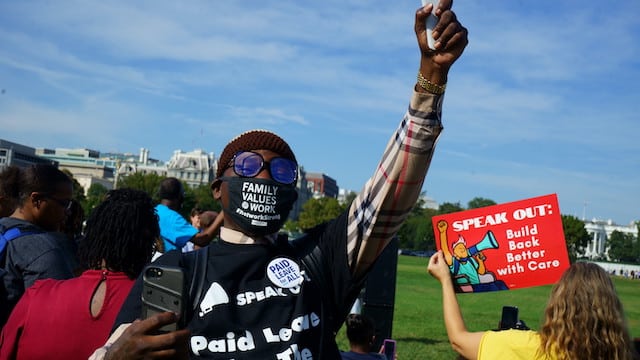Sen. Gillibrand Pushes to Expand Family and Medical Leave Act

WASHINGTON — Twenty years after Congress enacted the Family and Medical Leave Act, the law continues to evolve.
Sen. Kirsten Gillibrand, D-N.Y., wants to be part of that evolution. She said Friday she will help lead the effort to get Congress to pass a paid-leave component as part of her “American Opportunity Agenda.”
Gillibrand said the proposal is designed for a changing American work force where women are the primary breadwinner in 40 percent of families with children under age 18.
“Rebuilding America’s middle class relies on keeping every woman who wants to be in the workplace in the work force and earning a paycheck,” Gillibrand said during a speech at the Center for American Progress, a liberal-leaning Washington think tank.
More often than not, women are the ones who leave the work force to care for a family member, she said.
The 1993 Family and Medical Leave Act requires employers with at least 50 workers to provide up to 12 weeks of unpaid leave for employees who are seriously ill, taking care of a family member with a serious health condition, caring for an infant under a year old or adopting a child.
An estimated 100 million people have used the act to take unpaid leave, according to the National Partnership for Women and Families.
A 2010 defense authorization law doubled, to 26, the number of weeks of leave for military family caregivers under the act. It also expanded coverage to include short-notice deployments of a family member, attendance at certain military ceremonies and child care issues arising from a service member called to active duty.
Earlier this year, the U.S. Labor Department clarified the definition of a dependent child to include adult children who may have suffered a disabling illness after turning 18.
And the June ruling by the Supreme Court legalizing gay marriage has expanded the definition of family members eligible to use the act.
What’s lacking, say advocates for women’s rights and families, is coverage for employees at smaller businesses and a provision for paid time off for even a few sick days.
Gillibrand’s agenda includes raising the federal minimum wage to $10.10 an hour, increasing the federal child care tax credit and requiring universal pre-kindergarten.
Democrats in Congress have long advocated expanding the Family and Medical Leave Act to include paid leave, but their efforts have been unsuccessful.
Gillibrand wants to highlight the issue in a Congress where the number of women senators has reached an all-time high of 20. Female senators from both parties banded together to push for reauthorization of the Violence Against Women Act and helped heighten public awareness of sexual assaults in the military.
The Family and Medical Insurance Act, part of Gillibrand’s agenda, would use money collected through a new payroll tax to finance a trust fund to pay for paid leave.
“We would create a self-funded paid medical leave insurance fund without adding one dime to the deficit,” she said.
Employers and workers each would contribute 0.2 percent, with a maximum weekly payroll deduction of $4.36. While on paid leave, workers would receive up to two-thirds of their regular pay. A maximum weekly benefit also would apply.
Democratic Rep. Rosa DeLauro of Connecticut, a longtime advocate of paid family leave, will be the lead House sponsor of the bill.
Over the summer, Rhode Island became the third state — joining New Jersey and California — with a paid-leave program that provides partial wage replacement. The New Jersey Family Leave Insurance law pays cash benefits for up to six weeks for workers who take off to care for a seriously ill family member or for the birth of a newborn or the adoption of a child.
Family advocates want New York state to join that list. New York requires all firms except sole proprietors to provide temporary disability insurance that’s financed with a payroll deduction. Eligible workers can receive up to $170 weekly for up to 26 weeks under the program, which is separate from worker’s compensation for job-related injuries.
Several Democrats in the New York state Senate earlier this year proposed increasing the maximum weekly disability benefit to $500 by 2017 through an additional employee payroll deduction of up to $1.69 a week that would allow working mothers to take up to 12 weeks of paid leave.
“Most families can’t afford to take very much time off,” said Sherry Leiwant, co-president of A Better Balance, a New York City family advocacy group. “I think that the next step clearly for the Family and Medical Leave Act is to make it paid leave.”
Leiwant noted that the New York Assembly has passed a paid-leave bill twice but it has not been part of Gov. Andrew Cuomo’s agenda for women.
“I can’t understand why they haven’t done it,” she said.
Gillibrand said Friday she intends to lobby New York officials to enact paid family leave at the state level while also sponsoring Senate legislation to expand the Family and Medical Leave Act nationally.